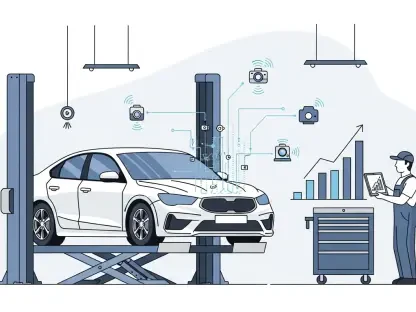The financial landscape for many American households continues to be plagued by inflation, mounting debts, and dwindling financial security, as recent studies indicate. A survey conducted by Prosper Marketplace, which involved 1,009 adults who make financial decisions for their households, offers a revealing snapshot of personal finances across the nation. Comparing today’s perceptions and behaviors to those from several years ago, the data shows a stark difference in optimism and financial confidence. Nearly half of the respondents felt economic conditions had deteriorated since the COVID-19 pandemic, although 48% remain hopeful for improvements over the next three years. Interestingly, the survey uncovered significant gender disparities, with men generally more optimistic than women about future economic prospects.
Addressing Inflation and Economic Concerns
Inflation has become a predominant worry among American consumers, with only 39% of men and 28% of women believing their income has kept pace with rising costs. This sentiment is markedly more pronounced among older adults, with only 23% sharing this view. The persistent rise in living expenses has particularly impacted consumer spending patterns, with many citing grocery prices and overall income levels as critical factors. The weight of inflation on everyday expenditures is evident, reflecting a broader concern that affects the nation’s economic stability.
The study found an alarming trend where most respondents are struggling to maintain their purchasing power. The rising costs have forced many households to reassess their financial priorities, often at the expense of discretionary spending. This reallocation has led to reduced spending on non-essential items, revealing the depths of financial strain felt by average consumers. As inflation continues unabated, these concerns showcase a need for policies aimed at stabilizing the economy and enhancing consumer purchasing power.
Investment Habits and Participation
Investment behaviors, as highlighted by the survey, also reflect considerable gaps and hesitations among Americans. A striking 68% of respondents reported not making any investments to build wealth. Among those who do invest, retirement funds, stocks, and high-yield savings accounts are the preferred choices. Notably, these investment habits vary significantly across different age groups, with younger adults being particularly less likely to engage in any form of investment. The reluctance to invest among the younger demographic underscores a broader issue of financial literacy and confidence in managing personal finances.
This investment gap signifies a missed opportunity for many to build long-term financial security. The lack of participation in wealth-building activities not only impacts individual financial health but also hampers broader economic growth. Addressing this issue requires enhanced investment education and making resources more accessible to encourage informed decision-making. By empowering individuals with the knowledge and tools needed, barriers to investment can be reduced, paving the way for greater financial security and prosperity.
The Burden of Debt
Debt remains a pressing issue for many households, with a noteworthy rise in credit card debt reported in the study. In the current year, 63% of respondents disclosed they could not pay off their credit card balances in full, a significant increase from the situation several years ago. Alarmingly, 28% of those with debt admitted to missing at least one payment in the past year. This escalating debt load showcases the financial difficulties many continue to face, exacerbated by ongoing economic uncertainties.
Furthermore, living paycheck to paycheck has become a more common reality, with 57% of respondents indicating this struggle. This experience is particularly acute for women, 62% of whom reported living paycheck to paycheck compared to 52% of men. These findings highlight stark financial divides and underscore the fragile financial situation many Americans find themselves in today. The need for empathizing financial products and services that offer tangible support, like budgeting aids and debt management plans, is more crucial than ever.
Financial Confidence and Future Prospects
Despite high levels of financial awareness, only a minority of respondents feel they have the freedom to make enjoyable purchases or feel in control of their finances. Specifically, only 46% felt they had the financial freedom to buy things they wanted, and 57% felt in control of their finances. The sense of financial security is further marred by low confidence in handling financial emergencies, with only 42% feeling prepared for unexpected expenses. This lack of preparedness signifies a substantial gap in financial planning and reflects the anxiety many have about their economic futures.
Practical financial tools and guidance emerge as essential needs to address these issues effectively. The demand for clearer investment education, user-friendly budgeting apps, and better access to employer-sponsored financial planning services is apparent. By providing these resources, financial institutions and policymakers can help uplift consumer confidence and promote a more resilient financial environment. Such measures are integral to fostering a culture of proactive financial management and ensuring broad-based financial well-being.
Conclusion
Inflation has become a significant concern among American consumers. Only 39% of men and 28% of women believe their income has matched the rise in costs. This sentiment is even more pronounced among older adults, with merely 23% expressing this view. The consistent increase in living expenses has heavily influenced consumer spending behaviors. Many people point to grocery prices and overall income levels as the main issues. The impact of inflation on daily expenses is clear, revealing a broader anxiety that threatens the nation’s economic stability.
The study shows a troubling trend: most respondents are grappling to maintain their purchasing power. Rising costs have compelled numerous households to reevaluate their financial priorities, often sacrificing discretionary spending. This shift has resulted in cutbacks on non-essential items, highlighting the severe financial strain experienced by the average consumer. As inflation continues unchecked, these concerns underscore the urgency for policies focused on economic stabilization and bolstering consumer purchasing power.









